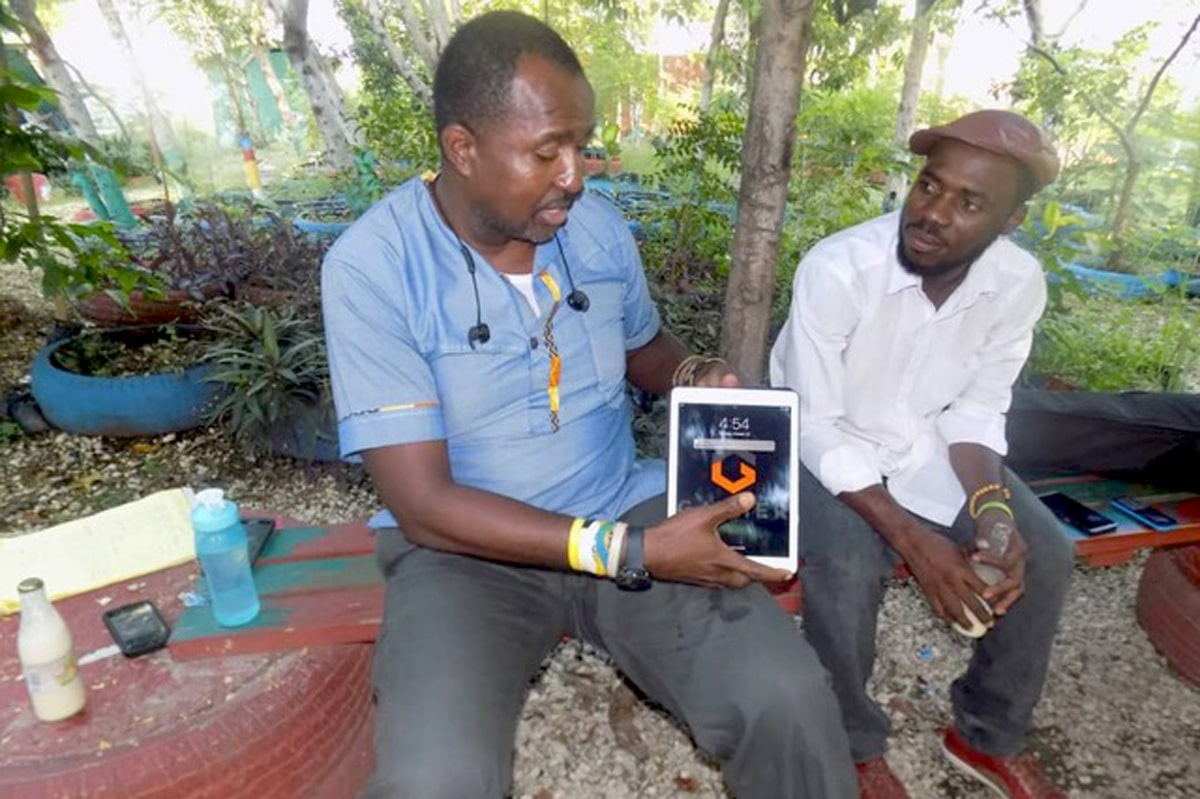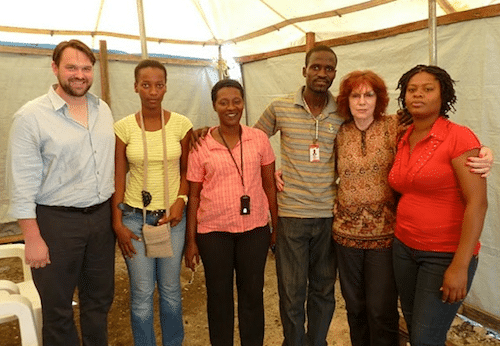Thank you to those who stand with Haiti
By Daniel Tillias, Goldin Global Fellow, Haiti
A letter to the Goldin Institute's global network of champions for community driven social change on the 10th Anniversary of the earthquake in Haiti
Thank you for keeping your promise.
After the earthquake, ten years ago, a lot of promises were made. I remember people saying that out of this terrible tragedy a new way of doing things, a true solidarity with Haitians, would emerge. They said we would “build back better.”

But too often and so unfortunate this did not happen. Only a tiny percentage of the resources pouring into Haiti after the earthquake went to grassroots Haitian-led groups like SAKALA, the people who were in the best position to know the conditions on the ground. Too often groups like SAKALA were forgotten and we continue to be forgotten by some of the largest donors.
But you did not forget us. Time and again we have treasured not only your support but THE true solidarity – the tougher the times, the more you are there for us.

I am SAKALA, the children in Cite Soleil are SAKALA , you are SAKALA , we are all SAKALA, all together we contribute to the only promise that has been kept, not the charity one but the solidarity one. The one that allows SAKALA to continue being home of the largest urban garden in the country, the hub supporting the largest waste revalorization initiative in the country, the place where butterfly, dragonfly and birds to share with the children there the hope they can fly and will.

Thank you for this solidarity, thank you for inspiring such a difference in Cite Soleil my home town. Happy New Year of continuing effort making the New beginning of Haiti happening in Cite Soleil.
Be the change!
Daniel
Reflections on the 2010 Earthquake in Haiti

At 4:53 pm, January 12, 2010 an earthquake with a magnitude of 7.0 on the Richter scale struck the island of Hispaniola, comprising the two nations of Haiti and the Dominican Republic, 15 miles southwest of the Haitian capital of Port-au-Prince.
“In ten seconds, everything the population took decades to build was destroyed,” recalled Goldin Institute Global Associate Malya Villard Appolon, co-founder of KOFAVIV (Commission of Women Victims for Victims). With additional damage from two aftershocks hours later, some three million people were impacted, one-third of the Haitian population. Over a million people were displaced as their homes were destroyed and between 85,000 and 316,000 were killed, based on varying estimates offered by USAID and the Haitian government with international relief agencies.

Reflecting on the recently passed ninth anniversary of the 2010 earthquake, Malya recalled, “On that day, nobody had a roof on top of their head. Everybody took refuge on the streets and parks, which caused what we called ‘the camp phenomenon’ and led to women enduring inhuman and degrading conditions. At that time, basic services were non-existent, insecurity was the norm, and women faced very difficult situations.” Assisted by the Goldin Institute as well as various international NGOs, Malya and her colleagues at KOFAVIV not only provided basic reproductive and medical assistance to displaced female survivors of sexual assault and rape, but also trained male allies to be guardians of women and girls at risk of gender-based violence.
The months and years since the earthquake have seen additional disasters, natural as well as man-made. In October of the same year as the earthquake, Haiti was hit by a cholera epidemic following the discovery of cases in the areas around the Artibonite River, the longest in the country and a major source of drinking water. Identified as a South Asian strain of the cholera bacteria, the disease was quickly traced to Nepalese soldiers who were stationed in Haiti as peacekeepers at that time. Before the epidemic could be mitigated, 770,000 Haitians were sickened and 9,200 died.
Two years later, Hurricane Sandy inflicted further physical damage on the island of Hispaniola, setting Haiti even further back on its slow march toward rehabilitation. Then last February, an internal investigation by Oxfam UK was made public, revealing systemic, widespread use of sex workers - many underage - by Oxfam foreign staff since the 2010 earthquake.
Despite the loss of their physical offices due to insecurity and death threats, the volunteers of KOFAVIV and the women they serve endure and persist. Exiled to the United States, Malya’s dedication and connection to the KOFAVIV community is unwavering.
“Even after nine years of these unfortunate events, the situation in Haiti remains the same,” she observed. “The consequences of the earthquake continue to haunt women. Their misery is not over. Even today, they are homeless and their safety is more at stake. They are raped every day.”
GI Associate Malya Villard Reports from Philadelphia, PA

Recent interview provides inspiration and plans for future expansion of KOFAVIV
We recently caught up with Global Associate Malya Villard-Appolon, although not in Haiti running KOFAVIV as you would normally expect to see her, but in Philadelphia. Malya's work to reduce all forms of violence perpetrated against women and girls living in camps and communities has made great strides but also put her in a volatile situation. Being the most visible advocate for justice for women who have been attacked has lead to her being forced to seek refuge in Philadelphia until she can safely return to Haiti. Although she is separated from family and forced to temporarily continue her important work from overseas, Malya is as brave and resolved as ever.
We are excited to share this interview with Malya where she speaks passionately and courageously about her work. A quick update of KOFAVIV's work over the past two months reveals that twenty-five trained male agents now work in high risk areas to prevent violence and provide support when women are attacked. In addition, the organization's call center is up and running. As a testament to its importance, within the 15 day period of April 15 to April 30, the center received 153 calls, two from victims of sexual violence, 104 calls for information and 47 calls for advice.
Malya and the KOFAVIV staff will continue, despite constant threats, to ensure the safety of those in their community and a brighter future for Haiti. In the video segment below, Malya speaks about continuing the fight against violence towards women and her plans and hope for the future, despite the personal setbacks suffered.
To find out more on how you can join Malya in the fight to end gender-based violence in Haiti, please follow this link.
Rape Accountability and Prevention in Haiti
Executive Summary of the Project
Since the Jan. 12, 2010 earthquake in Haiti, women and girls living in the internally displaced persons camps face alarming rates of rape and other forms of gender-based violence. In many camps, the rate of gender-based violence has exploded to three times pre-earthquake levels. In the year since the earthquake, our partners at KOFAVIV have documented 640 cases of rape in 2010.
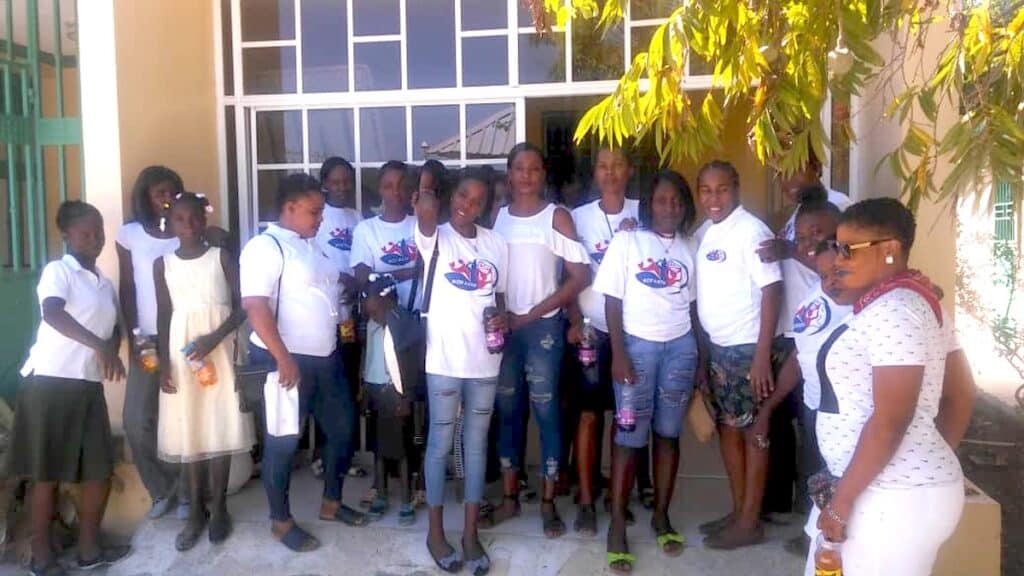
This pilot project is designed to provide security in the Place Petion community of Champ de Mars using women-led, community-based security teams to patrol the camp, discourage and disrupt incidents of gender-based violence and provide necessary escort services to vulnerable residents.
The Goldin Institute has partnered with KOFAVIV, FAVILEK, the Bureau des Avocats Internationaux (BAI), the Institute for Justice and Democracy in Haiti (IJDH) and its network of partners throughout Haiti to build and support a women-led, community-based pilot security platform in one representative displacement camp. This project builds on the strategy developed and implemented by KOFAVIV and FAVILEK, the GI's experience in creating grassroots partnerships for social change and the BAI / IJDH's capacity for legal advocacy in Haiti.
As part of the Rape Accountability and Prevention Project in Haiti, this security platform aims to prevent gender-based violence through the leadership and strategies of women's networks while the work of prosecution is ongoing. This pilot project is designed to serve as a model for community engagement and the provision of security that can be adopted by NGOs and the Government of Haiti.
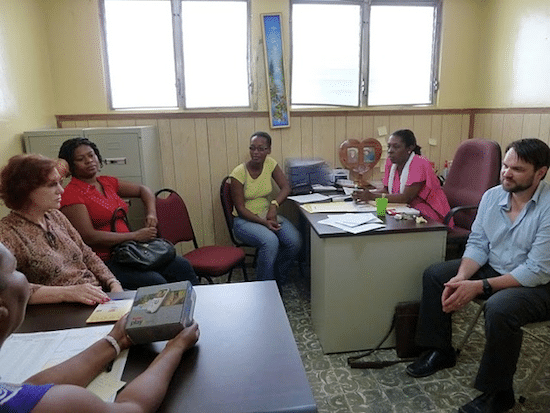
Project Rationale
The problem of GBV in post-earthquake Haiti must be understood within the broader context of the humanitarian response. There is a demonstrated lack of governmental response to sexual violence occurring in the camps. This failure to act appears to have two prongs—the Haitian Government lacks both the political will and the capacity to respond. Furthermore, despite billions of dollars being pledged by the international community for recovery, aid efforts have struggled to meet the basic needs of people living in IDP camps. Having no other options, Haitian grassroots women's groups have resorted to taking charge of their own security. Haitian women are both disproportionately impacted by the crisis and key to their country's recovery.
The reality is that grassroots women's groups have been mostly shut out from the process of crafting a response to the real threat of rapes in the camps. Meanwhile, they have mobilized their own solutions, distributing whistles to women living in camps and organizing groups of women to accompany each other to vulnerable locations like latrines, where many attacks have previously taken place. Each of the women engaged in the project brings a deep commitment to the work, and their life stories are a testament to that dedication.
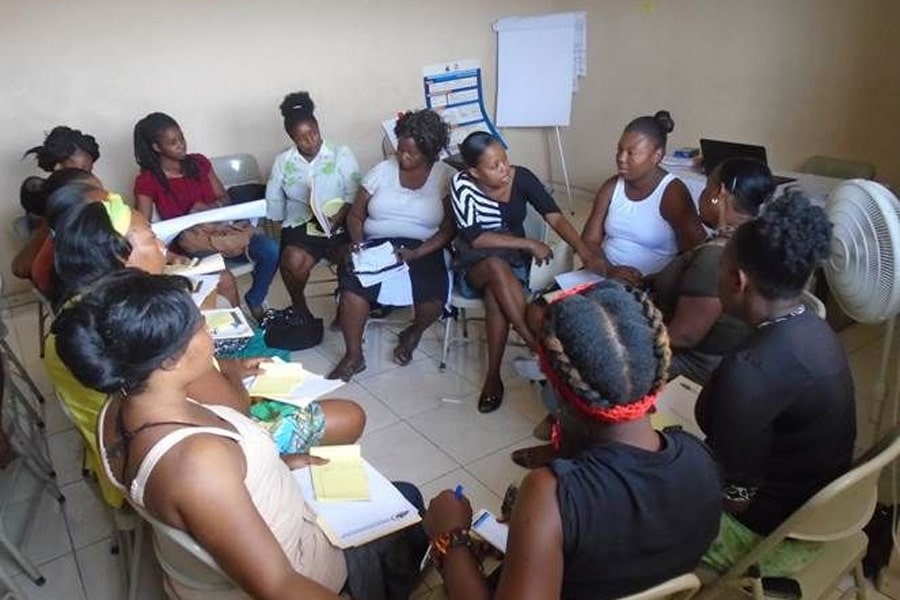
Brief History of the Project
The Haiti Rape Accountability and Prevention Project (RAPP) is designed to respond to the epidemic of rapes against poor women and girls in Haiti in the wake of the Jan. 12, 2010 earthquake. The program includes four closely integrated components: legal advocacy, healthcare, organizing, and public advocacy. RAPP provides individual victims of sexual assault the legal services they need to obtain justice and compensation, while working with allies in Haiti and abroad to transform the social context that underlies the vulnerability of all poor Haitian women to assault. The Project also aims to deter future rape by punishing the perpetrators and forcing a more effective response by law enforcement and the justice system. In February 2011, the Goldin Institute began its association with RAPP with the Camp Security and Sensitization Project.
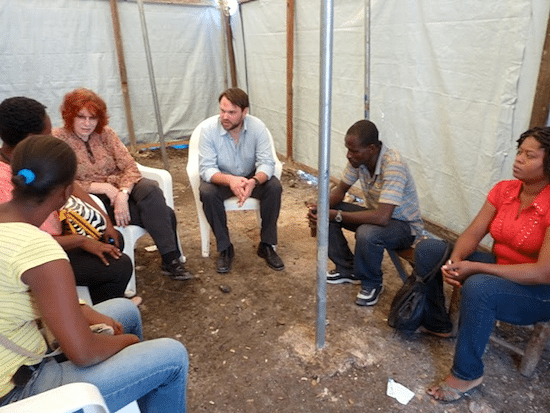
Shared Goals of the Project
This project seeks to substantially improve security and bring an end to gender-based violence in the camp where it is piloted in the Place Petion section of Champ de Mars. In addition to the immediate impact of improved security, we hope that it will provide some meaningful work for security providers and highlight the efficacy of partnering with community based groups, especially those led by women. We hope that this project will serve as a model for the Government of Haiti and relevant NGOs that will be able to scale up this important women-led, community-based initiative.
If successful, this project may also serve as a model for similar grassroots partnerships within the Goldin Institute's global network.
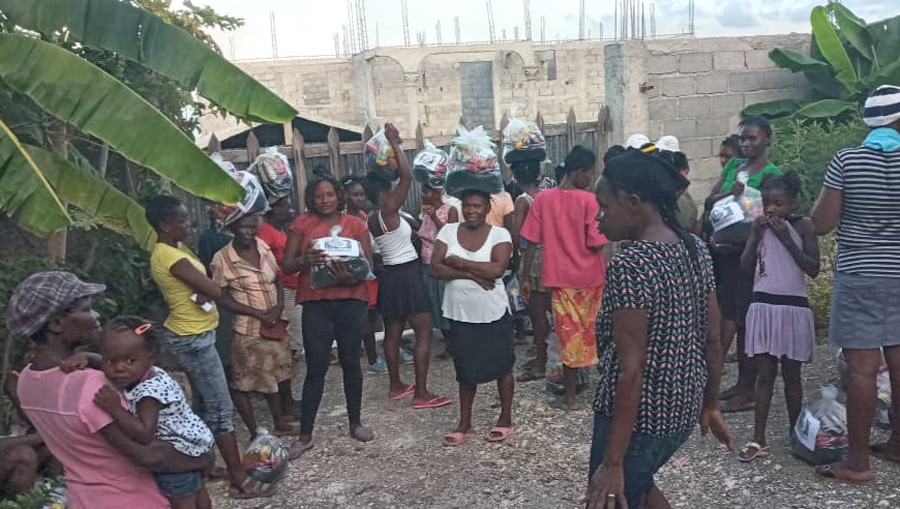
Project Outcomes
- Immediate and sustained reduction in gender-based violence in Champ de Mars.
- Improved sense of security for vulnerable people in Champ de Mars.
- Opportunity for women to design, lead and implement an innovative community based initiative.
- Increased cooperation between women's groups and the network of partners in Haiti.
- Augmented international profile for local partners through sharing the success of the project broadly.
- Opportunity to engage relevant parties in NGOs and the Government to educate them on the need and efficacy of working with grassroots groups, especially women's groups.
